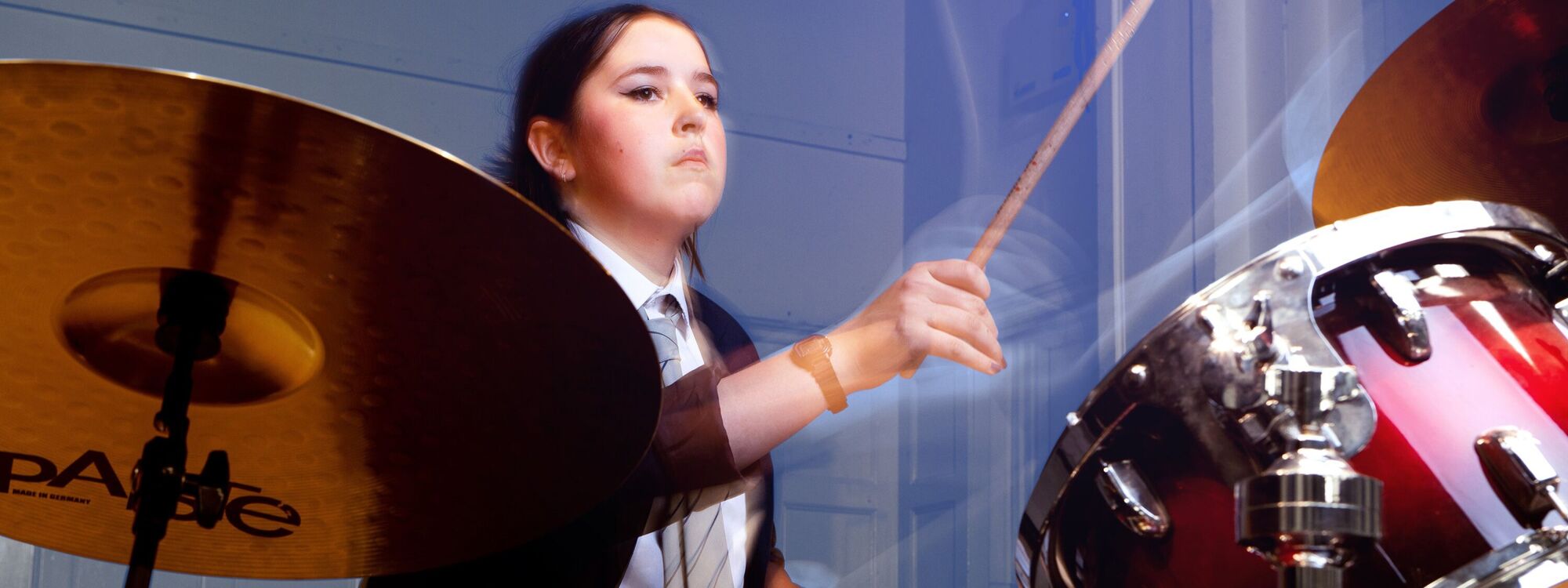
The heartbeat of any school is a thriving programme of practical music making. We firmly believe that rather than just teaching music we are creating musicians who are on a journey to develop their musicianship and skills, which will in turn help develop critical skills in other subject areas.
We aim to: make music learning relevant to students, connecting their in-school and out-of-school interests and experiences and enable students to experience practical music making, to understand the processes of music making, and for music making to contribute to their overall social, educational and personal development
Alongside these aims we identify the best musicians and raise their skills to a very high level, to prepare them for the next step of their musical education.
Music is a moral law. It gives soul to the universe, wings to the mind and flight to the imagination.
PLATO
We believe music is a universal language that crosses many divides that we see in the world. It is a highly academic subject requiring students to analyse and comment upon composers and performers intentions as well as discusses key musical features of a large number of genres. It helps build skills for life-long learning such as self-discipline, resilience and teamwork.
Music qualifications are highly regarded by colleges of further education and employers alike as musicians are trained to work methodically and to be self-disciplined.
In Years 7 and 8 students follow a broad range of topics to improve their musical skills. These focus on singing, orchestral music, rhythm skills covering music from around the world including Samba and Gamelan, keyboard, ukulele and guitar skills, the Blues and the history of pop music; chords and following chord-chart and notation. We are extremely proud of the fact that we have a class sets of brass, woodwind and strings and these are introduced in the first term. It's a privilege to be able to offer our students this rich hands-on experience with so many orchestral as well as pop, Samba and Gamelan instruments. Students will develop the core musical skills of performing, improvising, composing and listening and appraising. A wide range of music is covered from all different backgrounds and cultures. Students are also able to use a range of music technology to support their on-going learning in music.
In Year 9 students begin their preparatory year for both the GCSE and vocational qualifications extending their experiences of performing, composing and critical listening through a listening diary. We focus on further enhancing ensemble skills through class and small group performances looking at the set works of Badinerie by Bach and Africa by Toto. Students explore music spanning the centuries up to Jazz, Blues, modern pop styles and Bhangra. Students will then examine the role of music in film and theatre looking at music from Back to the future, Schindler's List, Jaws and other great music from Hans Zimmer, Bernard Herman and John Williams.
Students have the opportunity to venture down more technological or performance based pathways depending on their experience, skills and interests.
At the end of Year 9 students will decide which exam path to continue on to in Years 10 and 11. Both courses overlap with their focus on performing and composing. The GCSE has a written exam where analysing skills are externally assessed. The vocational qualification replaces this with more logging, blogging and evidencing of the processes behind performing and composing. In the final part of this course students will curate the music for an imaginary music festival showing how their own performances and compositions could be included and which other famous musicians and works they would consider suitable. Both courses are challenging and exciting.
David Berliner BMus (Hons) is the Director of Music.
Andrew Craggs is a Performing Arts Technician.
Niall Murray is a Teacher of Music.
I really appreciate the opportunity that you give to such a variety of performers. From the Year 7 child at the start of the evening who stands at the mic and sings a song unaccompanied that he has written to the Year 11 child who is astounding on the piano playing a classical piece.
There is an inclusivity in the music department that shines through the evening. I can see that children are encouraged to 'give it a go' and supported to be brave.
Parent feedback following a Spring Music Celebration
Three concerts each year; numerous performances and workshops around Brighton and Hove including the Childrens Parade, Glyndebourne, Brighton Early music Festival and Brighton Dome. Music is also usually a feature of the Artists' Open House exhibition.
Lower school voices, chamber choir, concert band/orchestra, lower school rock and orchestral instruments band, Rock Factory, flute group, samba band.